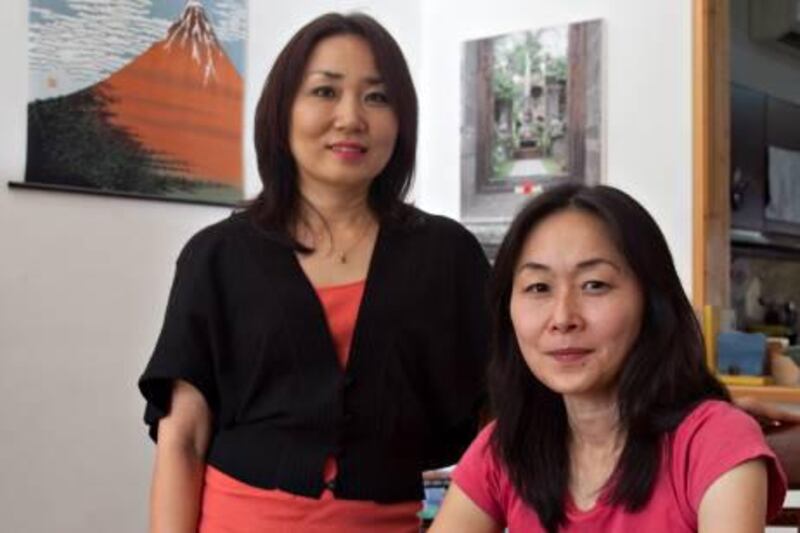RAS AL KHAIMAH // When Yuki Pellerine returned to her home town in Japan last summer, she wasn't prepared for what she saw. Of about 600 houses, only 80 or so remained after the devastation of the tsunami and earthquake.
"I stood where I used to live and I couldn't recognise anything," said Ms Pellerine, who comes from Toyoma in the Fukushima Prefecture - just 60km south of the Fukushima nuclear power plant. "There were no buildings at all. I really couldn't understand where I was standing - that was a little bit emotional for me."
Ms Pellerine is understated in expressing her heartbreak, but her grief was clearly understood by the community in her second home, Ras Al Khaimah - who responded immediately.
Alongside several other Japanese women in RAK, Ms Pellerine has worked tirelessly since last year to make sure the natural disaster and her country's suffering is not forgotten.
She has helped organise ongoing charity events to raise cash and awareness, knowing that reconstruction will last longer than the media's attention.
One of the first places to benefit from donations from the RAK community was Ms Pellerine's old elementary and middle school.
The seaside middle school was so badly damaged that students had to move to the nearby elementary to take lessons in partitioned classrooms.
Artists and businesses in RAK made donations at an April charity night held at the Tower Links Golf Club. A total of Dh37,000 was raised and donated to the school and its pupils.
Natalie Kozen, originally from the United States, helped her students at the RAK Women's College set up a fund-raising stall two days after the tsunami and earthquake struck.
"I think it's the nature of the event that it can happen to any of us," said Ms Kozen. "We all feel so far away from home. We all felt connected to Yuki in a way."
Many expatriates living in RAK, though not Japanese themselves, had lived in the country or have family connections there.
"I think there are a lot more people connected to Japan than we think," said Ms Kozen. "The Japanese community was really supportive of their home country.
"They felt like they wanted to be there and so they had to do something and the rest of the community was happy to support them."
Japanese citizen Shiori Gallagher and her children helped organise a table at the RAK English Speaking School's annual charity day. Although the event usually raises money for the Red Crescent, an exception was made to help the Japan appeal.
For Ms Gallagher, it was important the children learn these tragedies can happen, and that what Japan went through was not an isolated incident.
"A week before the Japanese disaster another big earthquake hit New Zealand and I felt sorry after that because I knew people there were looking for some help as well," said Ms Gallagher.
The RAK community's support for Japan has been ongoing - and it needs to be.
Pupils in Toyoma have been able to return to their middle school, but the town was classified as dangerous by officials and many of the buildings left standing have been demolished.
Now many residents have been left homeless, jobless and are living in temporary houses set up a park.
People are looking for a safe place to rebuild, although the reconstruction is expected to take up to 10 years.
This spring, new fund raisers will be held to pay for the decontamination of playgrounds in Minamisoma city, a town that had a population of more than 68,000 located 25km north from the Fukushima plant in the radiation zone.
Aikiko Cleaver will be among the women selling sushi, kakigori and Japanese curry at the Ras Al Khaimah English Speaking School. Last year they raised about Dh10,000.
"People think that Japan is a very developed country and they can do very advanced things, but it's not that easy," said Ms Cleaver. "It will be maybe 10 years for a full recovery so there's still a need. We still need lots of help."
This year's fund raising efforts are off to a flying start, with more than Dh6,000 donated by runners taking part in the RAK half marathon.
"There are only a few Japanese ladies living in RAK, but people are very generous, it's a very amazing community," said Ms Cleaver.
"It's a very tight community with so many nationalities living together. They just give and give and give."
Ms Pellerine said she and her friends have been shocked at the level of support they have received.
"I was very touched by the people, how generous the people are. Some people had never been to Japan and they're really helpful and kind, and generous.
"That's something I also learnt, I gained through these activities. People are really kind."






